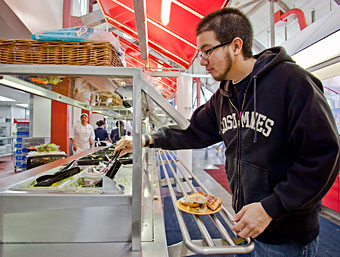Over the past five years, UCSC Dining Services has taken a number of steps toward increased sustainability, including the following:
. Dining Services teamed up with PG&E to replace old lighting with more energy-efficient alternatives, saving nearly $10,000 annually. A $26,500 rebate from PG&E will fund future sustainable Dining Services projects.
. Installation of 56 Energy Star-rated appliances has cut most department energy costs in half.
. Elimination of all food trays is saving an estimated 30,000 gallons of water a month while reducing water-heating costs and the use of cleaning chemicals. Food waste per plate has been cut by more than 40 percent-significant, since Dining Services serves more than 11,000 meals per day.
. Thanks to a pilot composting program (collecting kitchen scraps from four dining halls and transporting to the Vision Recycling composting project at Buena Vista Landfill in Watsonville), Dining Services diverted nearly 30 tons of food scraps from the landfill between August 15 and December 1, 2008. Campus recycling has been instrumental in collection, transportation to the landfill, and supporting educational outreach.
. Compostable paper products and flatware made from corn or potatoes-100 percent biodegradable and compostable-have replaced traditional disposables.
. Vegetable and meat scraps are used for soup stock, and grease, fat, and French-fry oil are recycled for other purposes, such as biodiesel fuel. Other perishable food is donated to a local food bank. When food must be thrown away, it is converted to slurry with a pulper, reducing cubic yards of waste collected in dumpsters by two-thirds.
. All campus dining halls and retail locations brew Community Agroecology Network (CAN) coffee daily. An innovative project between the campus and coffee growers, CAN creates a fair-trade market and collaborates with farmers to improve local, sustainable farming practices.
. Cage-free eggs are available at all dining halls and retail locations.
. Nine campus dining locations are "green" certified by the Monterey Bay Area Green Business Program, and two more sites are being inspected and certified. To be certified "green," participants must be in compliance with program regulations and meet standards for conserving resources, preventing pollution, and minimizing waste.
. Other sustainable practices under consideration include using reusable containers for all to-go meals; investigating more vegetarian-based menu items; installing self-service water-bottle refill stations to reduce the use of disposable plastic water bottles on campus; and installing solar-powered trash compactors.



